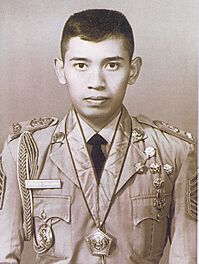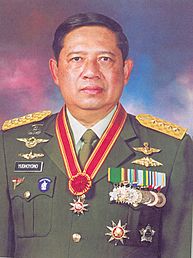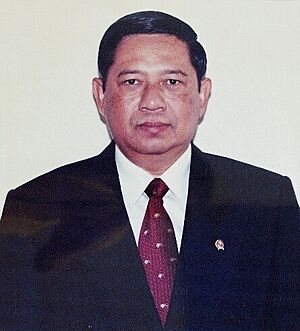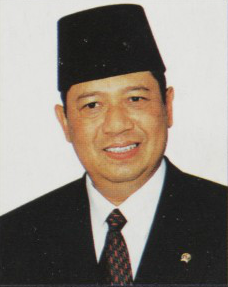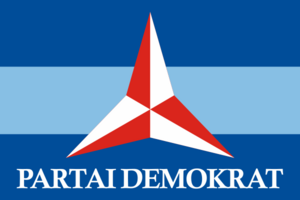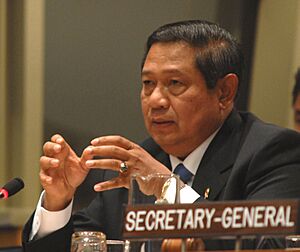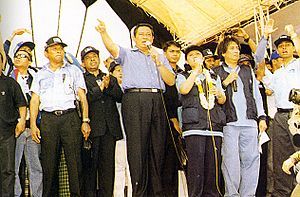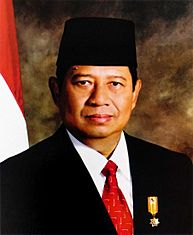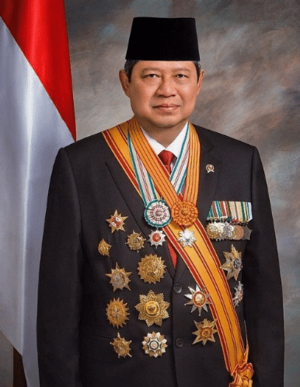Susilo Bambang Yudhoyono facts for kids
Quick facts for kids
Susilo Bambang Yudhoyono
|
|
|---|---|
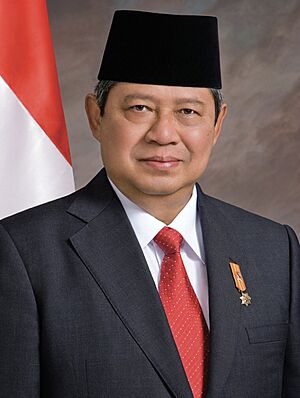
Official portrait, 2009
|
|
| 6th President of Indonesia | |
| In office 20 October 2004 – 20 October 2014 |
|
| Vice President |
|
| Preceded by | Megawati Sukarnoputri |
| Succeeded by | Joko Widodo |
| Coordinating Minister for Political, Social, and Security Affairs | |
| In office 10 August 2001 – 12 March 2004 |
|
| President | Megawati Sukarnoputri |
| Preceded by | Agum Gumelar |
| Succeeded by |
|
| In office 23 August 2000 – 1 June 2001 |
|
| President | Abdurrahman Wahid |
| Preceded by | Soerjadi Soedirdja |
| Succeeded by | Agum Gumelar |
| Minister of Mining and Energy | |
| In office 29 October 1999 – 23 August 2000 |
|
| President | Abdurrahman Wahid |
| Preceded by | Kuntoro Mangkusubroto |
| Succeeded by | Purnomo Yusgiantoro |
| Commander of Kodam II/Sriwijaya | |
| In office 23 August 1996 – 7 August 1997 |
|
| President | Suharto |
| Preceded by | Maj. Gen. Karyono |
| Succeeded by | Maj. Gen. Suadi Atma |
| Chairman of the Democratic Party | |
| In office 30 March 2013 – 15 March 2020 |
|
| Preceded by | Anas Urbaningrum |
| Succeeded by | Agus Harimurti Yudhoyono |
| Personal details | |
| Born | 9 September 1949 Patjitan, Indonesia |
| Political party | Demokrat |
| Height |
|
| Spouse | |
| Children |
|
| Parents |
|
| Relatives |
|
| Alma mater |
|
| Occupation |
|
| Signature | |
| Nicknames |
|
| Military service | |
| Allegiance | Indonesia |
| Branch/service | Indonesian Army |
| Years of service | 1973–2000 |
| Rank | General (honorary) |
| Unit | Infantry (Kostrad) |
| Commands | Kodam II/Sriwijaya |
| Battles/wars |
|
| Awards |
|
| Service no. | 25308 |
Susilo Bambang Yudhoyono (born 9 September 1949), often called SBY, is an Indonesian politician and former army general. He served as the sixth president of Indonesia from 2004 to 2014. He was the second president from a military background after Suharto.
SBY founded the Democratic Party of Indonesia. He was its 4th chairman from 2014 to 2020. He also served as a coordinating minister for political and security affairs. He was also the president of the Assembly and chair of the Council of the Global Green Growth Institute. He also led ASEAN when Indonesia hosted its summits.
Yudhoyono won the 2004 presidential election. This was Indonesia's first direct presidential election. He defeated the president at the time, Megawati Sukarnoputri. He became president on 20 October 2004, with Jusuf Kalla as his vice president.
He ran for re-election in 2009 with Boediono as his running mate. He won with a clear majority in the first round. He started his second term on 20 October 2009.
During his time as president, Indonesia took part in many world peace efforts. Yudhoyono successfully helped create a peace agreement that ended the Aceh conflict. This conflict lasted from 1976 to 2005. Because of this, he was called "Father of Peace."
Susilo Bambang Yudhoyono received the Lifetime Achievement Award (Champions of the Earth) in 2014.
Contents
About His Name
The name Susilo Bambang Yudhoyono comes from the Javanese language. It has roots in Sanskrit. Susilo means "good behavior" or "moral." Bambang is a traditional Javanese male name meaning "knight." Yudhoyono means "journey of battle" or "war mission." So, his full name means "well-behaved knight on a war mission."
"Yudhoyono" is not a family surname. Most Javanese people do not have surnames. He chose it for his military name-tag. His children and grandchildren use "Yudhoyono" as their last name. In formal settings, he is called Dr. Yudhoyono. In Indonesia, he is widely known as "SBY."
His Early Life and Schooling
Growing Up and Family
Susilo Bambang Yudhoyono was born on 9 September 1949. He was born in Tremas, a village in Pacitan Regency, East Java. His family was not wealthy. His father, Raden Soekotjo, was Javanese. His mother, Siti Habibah, was also Javanese.
His Education Journey
Yudhoyono wanted to join the army since he was a child. In school, he was known for being good at academics. He enjoyed writing poems, short stories, and acting. He was also good at music and sports. He and his friends started a volleyball club called Klub Rajawali. They also had a band called Gaya Teruna.
When he was in fifth grade, Yudhoyono visited the Indonesian Armed Forces Academy (AKABRI). Seeing the soldiers train there made him want to join the military. He planned to join after high school in 1968. However, he missed the sign-up time.
Young Yudhoyono then studied Mechanical Engineering at the Sepuluh Nopember Institute of Technology (ITS). Later, he went to a vocational center in Malang, East Java. There, he got ready for the military academy. Yudhoyono officially joined AKABRI in 1970 after passing the test.
Yudhoyono also studied in the United States. He earned his master's degree in Business Management from Webster University in 1991. He later received his PhD in agricultural economics from the Bogor Agricultural University. This was on 3 October 2004, just before his presidential win was announced. He also received honorary doctorates in law and political science. In 2014, he became a professor at the Defense University of Indonesia.
His Time in the Military
Military Academy Days
Yudhoyono spent three years at the AKABRI. He became the commander of the Cadet Corps Division. He graduated from AKABRI in 1973 as a second lieutenant. He was the best graduate of his year. He received the special Adhi Makayasa medal from President Suharto.
Serving in Kostrad
After graduating, Yudhoyono joined the Army Strategic Reserve (Kostrad). He became a platoon commander. He also taught general knowledge and English to soldiers. Because he was good at English, he was sent to the United States. There, he took Airborne and Ranger Courses in 1975.
Yudhoyono returned to Indonesia in 1976. He became a platoon commander in East Timor. He had several tours of duty there. He later became a mortar platoon commander in 1977. He was an operations officer and a company commander at Kostrad. From 1981 to 1982, he worked at the Army headquarters.
While at Army headquarters, Yudhoyono went to the United States again. He took an Infantry Officer Advanced Course. He also trained with the 82nd Airborne Division. He spent time in Panama learning jungle warfare. When he returned in 1983, he led the Infantry Trainers' School. He also went to Belgium and West Germany for an antitank weapons course. In 1985, he took a Battalion Commando Course in Malaysia.
From 1986 to 1988, Yudhoyono served in Kodam IX/Udayana. This area covers Bali and the Lesser Sunda Islands. He was a battalion commander and part of the operational staff. In 1989, Yudhoyono became a lecturer at the Army Staff College. He gave a speech about the military's future. He also wrote a book called "The Challenges of Development."
He continued his military education at the US Army Command and General Staff College. While in the United States, he earned his master's degree from Webster University in 1991.
In 1992, Yudhoyono worked as a speechwriter for the Army chief of staff. In 1993, he joined the personal staff of the commander of the Military of Indonesia (ABRI). He later became a brigade commander in Kostrad. A year later, he was an operations assistant in Jakarta. He then commanded the military area in Central Java. Yudhoyono also served as Indonesia's chief military observer for the United Nation Peacekeeping Force in Bosnia from 1995 to 1996.
When he returned, he became chief of staff for social-political affairs. He was also chairman of the ABRI Faction in the People's Consultative Assembly. He took part in Suharto's re-election as president.
Suharto's Resignation
In May 1998, during the time leading to Suharto's resignation, Yudhoyono met with pro-reform leaders. He agreed that Suharto should resign. However, he and other military officers were hesitant to publicly withdraw their support. Eventually, Suharto resigned on 21 May 1998.
After Suharto, Indonesia entered a new era. The military's popularity was low. To reduce the military's political role, Yudhoyono's position was renamed. In 1999, ABRI became TNI, and the police separated. Yudhoyono's popularity grew as he suggested ways to reform the military. He was known as "the thinking general" because of his education and ideas.
His Political Career
Wahid's Presidency
In 1999, President Abdurrahman Wahid appointed Yudhoyono as the minister of mining and energy. Yudhoyono ended his military career as a lieutenant general. He was later made an honorary general in 2000.
Yudhoyono became more popular as a minister. In August 2000, after a cabinet change, he became the coordinating minister for political and security affairs. One of his main jobs was to separate the army from politics. This matched his ideas for the future of the Indonesian military. He believed the military should focus on defense, not daily politics.
Another task was to act as a go-between for Wahid and the Suharto family. Wahid wanted Suharto to return money he supposedly gained through corruption. Yudhoyono tried to negotiate this but was not successful.
In early 2001, Wahid asked Yudhoyono to lead a crisis center. This center would advise the president. However, Yudhoyono later disagreed with Wahid. In July 2001, when Wahid faced impeachment, he asked Yudhoyono to declare a state of emergency. Yudhoyono refused, and Wahid dismissed him.
Megawati's Presidency
On 23 July 2001, Wahid was removed from office. Megawati became president. Yudhoyono ran for vice president but lost to Hamzah Haz.
Yudhoyono was then appointed to his old job. He became coordinating minister of political and security affairs in Megawati's new cabinet. After the 2002 Bali bombings in October 2002, he led the effort to find those responsible. He gained a reputation for being serious about fighting terrorism. His speech on the one-year anniversary of the Bali bombings was praised. Yudhoyono also advised Megawati on the Free Aceh Movement (GAM). On his advice, martial law was declared in Aceh in May 2003.
Forming the Democratic Party
Yudhoyono's supporters saw his popularity and potential as a leader. One supporter, Vence Rumangkang, suggested forming a political party. This party would help Yudhoyono in the 2004 Indonesian presidential election. Yudhoyono agreed, and Rumangkang started forming the party.
Meetings were held in August 2001 to discuss the party. Yudhoyono himself led meetings on 19 and 20 August 2001. The basic plan for the Democratic Party was completed.
On 9 September 2001, the party was officially announced. This date was Yudhoyono's birthday. The party was registered the next day. The founders made sure the party was closely linked to Yudhoyono.
Path to Presidency
In September 2003, Yudhoyono's party began preparing for his presidential nomination. They started a campaign to promote him. Yudhoyono, however, continued his duties as minister.
A key moment happened on 1 March 2004. Yudhoyono's secretary announced that Yudhoyono had been left out of important policy decisions. Megawati denied this. Her husband called Yudhoyono childish. On 8 March 2004, Yudhoyono asked to meet the president. Megawati did not respond. On 11 March 2004, Yudhoyono announced his resignation. He also said he was ready to run for president.
Yudhoyono's popularity grew after this. People saw him as the underdog. However, his party did not win many votes in the 2004 Indonesian legislative election. They got 7.5% of the votes, enough to nominate him. Yudhoyono accepted and chose Jusuf Kalla as his running mate. Several other parties supported them.
Yudhoyono's plan for Indonesia was in a book called Vision For Change. It focused on four main ideas: prosperity, peace, justice, and democracy. His top goal was to improve the economy. He aimed for at least 7% economic growth. He also wanted to help small businesses and fight corruption. He said that to attract investment, he would improve legal certainty and political stability.
Yudhoyono was seen as a strong candidate. He led in many polls. On 5 July 2004, he won the first round of the election with 33% of the votes. But he needed 50% to win outright. So, he went into a run-off election against Megawati.
In the run-off, Yudhoyono faced a strong challenge. Megawati's party formed a large coalition. Yudhoyono then declared his own "people's coalition." On 20 September 2004, Yudhoyono won the run-off with 60.87% of the votes. He became president on 20 October 2004. In 2010, he was recognized for his excellent political communication.
His Presidency (2004–2014)
His Government and Cabinets
Presidential elections were held in Indonesia on 8 July 2009. President Susilo Bambang Yudhoyono won over 60% of the votes in the first round. This meant he secured re-election without a second round. He was officially declared the winner on 23 July 2009. Other candidates were Megawati Sukarnoputri (26.79%) and Jusuf Kalla (12.41%).
On his inauguration day in 2004, Yudhoyono announced his new cabinet. It was called the United Indonesia Cabinet. It had 36 ministers from various parties. Many professionals were chosen for economic roles. Five former military members were also in the cabinet. As promised, four women were appointed. Yudhoyono's Second United Indonesia Cabinet was announced in October 2009. Boediono became vice president, replacing Jusuf Kalla.
Working with Vice President Kalla
Even though he won the presidency, Yudhoyono's party was not very strong in the Indonesian parliament. The Democratic Party had fewer representatives than other major parties. Yudhoyono and Kalla worked to gain more influence. Kalla was elected chairman of the Golkar party in December 2004. This made Kalla very powerful in parliament.
After the 2004 tsunami, Kalla took action to help Aceh. He ordered work to begin on rebuilding the area. Yudhoyono supported Kalla's actions.
In September 2005, Yudhoyono went to New York for a UN Summit. He left Vice President Kalla in charge. Yudhoyono held video conferences to get reports from ministers. Some people thought this showed Yudhoyono's distrust. Kalla attended only one video conference, focusing on party matters instead.
To ease political tensions, Yudhoyono sent Kalla to meet with national figures. Kalla met former President Abdurrahman Wahid and Megawati Sukarnoputri. These meetings helped improve communication between leaders.
Yudhoyono's first term was stable because he kept a good balance of power. But in his second term, when he chose a non-political vice president, his government faced more political challenges.
Foreign Relations
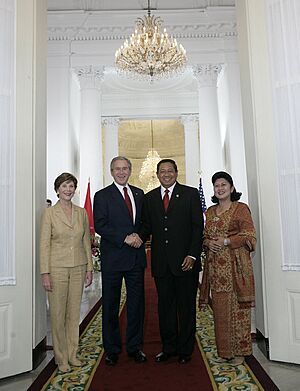
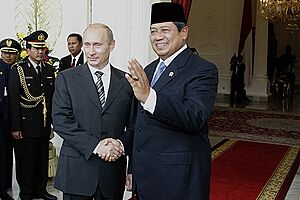
President Yudhoyono wanted to improve Indonesia's defense. He worked to end the US military embargo on Indonesia. The US government believed that helping Indonesia's military would fight terrorism and other issues. They saw Indonesia as a voice of moderation in the Islamic world.
In 2005, the US government allowed Indonesia to join military training programs again. They also removed limits on selling non-lethal defense equipment. Later, they lifted the ban on selling weapons. Indonesia used this to buy spare parts for its F-16 fighter jets. Yudhoyono also discussed defense cooperation with Russian President Vladimir Putin. He considered buying weapons from other countries too.
Aceh Peace Agreement
During his presidency, Yudhoyono achieved many important things. One major success was the peace agreement with the Free Aceh Movement (GAM). The agreement was signed in Helsinki, Finland, on August 15, 2005.
The conflict had lasted for almost 30 years. It started because of unfairness in Aceh, especially during the New Order era. This resistance turned into armed conflict, causing many deaths. GAM had an army that fought against the government.
Peace talks began earlier but stopped due to misunderstandings. They restarted during Yudhoyono's time. The Indonesian government's chief negotiator, Mr. Awaludin, explained why it worked. The government offered clear plans, including forgiveness for GAM members. They also offered social, political, and economic justice programs.
President Yudhoyono convinced the Indonesian military to support the peace process. He had been involved in talks since 2000. The 2004 tsunami disaster was also a big factor. It made both sides focus on helping victims instead of fighting. International pressure also encouraged GAM to negotiate. In the end, both sides were truly committed to talking.
Economic Policies
President Yudhoyono shared some of his government's economic achievements. He said that Indonesia had made good progress. In 2004, the economy had low GDP and limited infrastructure. After peaceful elections, the economy became more stable.
He noted that GDP and foreign exchange reserves grew a lot. The country's debt compared to its gross domestic product went down. It dropped from 56 percent to 23 percent. This was much lower than many developed countries. He also said that domestic and foreign debt decreased. The state budget increased four times.
In 2004, Indonesia's income per person was US$1188. Ten years later, it rose to US$3490. Indonesia also had the second-highest economic growth rate after China since 2009. The country's exports tripled. In the energy sector, electricity capacity doubled. Yudhoyono also mentioned the Master Plan for the Acceleration of Indonesian Economic Development (MP3EI). This plan involved large investments from 2011 to 2013.
Yudhoyono also decided to end the Consultative Group on Indonesia (CGI). He wanted Indonesia to be more independent. The CGI was a group of countries and organizations that gave loans to Indonesia. Yudhoyono said Indonesia no longer needed to discuss development plans with creditors. He wanted Indonesia to be fully responsible for its budget and financial needs.
Education and Social Protection
The Yudhoyono government passed a law in 2011 about social security. This law aimed to improve people's well-being. It created a health and employment insurance system. This system combined two state-owned companies: PT Jamsostek (for workers' social security) and PT Askes (for health insurance). These became BPJS Ketenagakerjaan and BPJS Kesehatan. Indonesian businesses supported this law.
In education, Yudhoyono started programs to improve human resources. One was the Schools Operational Assistance (BOS) program in July 2005. This program gave money to schools to help with their operations. Schools were expected to lower or remove fees. In 2006, he launched "BOS Buku" for buying textbooks. In 2011, he founded LPDP. This group provides scholarships for Indonesian students to study in Indonesia and abroad.
He also founded the Indonesian Defense University. This university focuses on military and defense studies. Near it, he established the Indonesia Peace and Security Center (IPSC). This center trains Indonesian peacekeeping troops for the UN. He started it because of his own experience in UN peacekeeping.
Other Activities
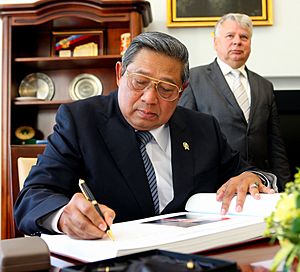
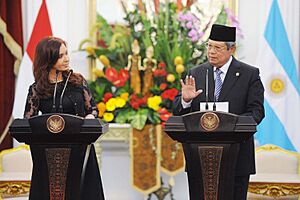
On 17 August 2007, Yudhoyono suggested that eight nations with large tropical rainforests work together. This was due to growing concerns about global warming. Indonesia led a summit of these eight countries in New York. These countries included Brazil, Cameroon, Congo, Costa Rica, Gabon, Indonesia, Malaysia, and Papua New Guinea. From 3 to 15 December 2007, Indonesia hosted a major climate change conference in Bali.
During a controversy involving Pope Benedict XVI's comments, Yudhoyono said the Pope's words were "unwise." But he also urged Indonesian Muslims to be wise and patient. He stressed the importance of harmony among people.
TIME Magazine named Yudhoyono one of the 100 World's Most Influential People in 2009.
During a visit to Australia in March 2010, he received an honorary award. He also spoke to the Australian Parliament. He was the first Indonesian head of state to do so.
Queen Elizabeth II gave Yudhoyono an honorary Knight Grand Cross of the Order of the Bath (GCB) on 30 October 2012.
Political Party Leadership
During his presidency, Yudhoyono strengthened his role in the Democratic Party. In May 2005, he was elected chairman of the executive board. This gave him the highest authority in the party.
2014 General Election
The Constitution of Indonesia limits presidents to two terms. This meant Yudhoyono could not run for a third term in the 2014 Indonesian presidential election.
After Presidency (2014–present)
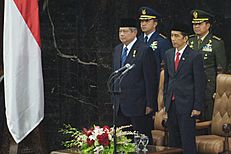
After his presidency ended in 2014, Yudhoyono remained active in politics. He was re-elected as the leader of his party in 2015. In the 2019 presidential election, he supported Prabowo Subianto for president. His son, Agus Harimurti Yudhoyono, replaced him as the leader of the Democratic Party on 15 March 2020.
After his 10-year presidency, SBY became President of the Assembly and Chair of the Council of the Global Green Growth Institute. This was from September 2014 to December 2016.
He lived with his wife Ani until her death on 1 June 2019. In November 2021, it was announced that Yudhoyono was diagnosed with early-stage prostate cancer. He received medical care in the United States. The president at the time, Joko Widodo, sent his medical team to assist with the treatment.
In the 2024 presidential election, he first supported Anies Baswedan. However, he later withdrew his support. He then chose to back Prabowo. Prabowo expressed his gratitude for Yudhoyono's support.
His Personal Life
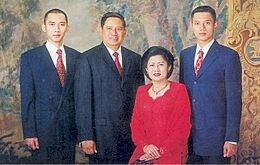
During his presidency, Yudhoyono lived in the presidential Merdeka Palace in Jakarta and at his family home in Cikeas, Bogor. He lived with his wife, Ani Yudhoyono. Ani Yudhoyono had a political science degree. She was the first vice-chairman of her husband's Democratic Party. She was the eldest child of retired army Lt. General Sarwo Edhie Wibowo.
Their elder son, Agus Harimurti Yudhoyono (born 1978), graduated from the Indonesian Military Academy in 2000. Like his father, he received the Adhi Makayasa Medal as the best graduate. In 2006, Agus earned a master's degree in strategic studies. He also studied at Harvard University. He is married to Annisa Pohan, a fashion model. Their daughter, Almira Tunggadewi Yudhoyono, was born in 2008. As of July 2025, he is serving as the 1st Coordinating Minister for Infrastructure and Regional Development under Prabowo's presidency.
Their younger son, Edhie Baskoro Yudhoyono (born 1980), earned his bachelor's degree in economics. He also has a master's degree. He is married to Siti Ruby Aliya Radjasa. They have two sons and two daughters. As of July 2025, he is serving as a Member of the People's Representative Council.
Family Tree
| Raden Soekotjo 1925–2001 |
Siti Habibah 1932–2019 |
Sarwo Edhie Wibowo 1925–1989 |
Sunarti Sri Hadiyah 1930–2021 |
||||||||||||||||||||||||||||||||||||||||||||||||||||||||||||||||||||||||||||
| Aulia Tantowi Pohan b. 1945 |
Mulyaningsih | Susilo Bambang Yudhoyono b. 1949 |
Kristiani Herrawati Yudhoyono 1952–2019 |
Pramono Edhie Wibowo 1955–2020 |
Muhammad Hatta Rajasa b. 1953 |
Oktiniwati Ulfa Dariah Rajasa | |||||||||||||||||||||||||||||||||||||||||||||||||||||||||||||||||||||||||
| Annisa Larasati Pohan b. 1981 |
Agus Harimurti Yudhoyono b. 1978 |
Edhie Baskoro Yudhoyono b. 1980 |
Siti Ruby Aliya Rajasa b. 1986 |
||||||||||||||||||||||||||||||||||||||||||||||||||||||||||||||||||||||||||||
| Almira Tunggadewi Yudhoyono b. 2008 |
Airlangga Satriadhi Yudhoyono b. 2012 |
Pancasakti Maharajasa Yudhoyono b. 2015 |
Gayatri Idalia Yudhoyono b. 2018 |
Alisha Prameswari Yudhoyono b. 2022 |
|||||||||||||||||||||||||||||||||||||||||||||||||||||||||||||||||||||||||||
Hobbies and Interests
Yudhoyono enjoys volleyball. He has loved the sport since middle school. He played it in high school, at the military academy, and even during his presidency. His love for volleyball led him to form a team called Bogor LavAni in 2019. The team's name comes from "Love" and "Ani," honoring his late wife.
Health Updates
Yudhoyono had a kidney infection in July 2018. He received treatment at a military hospital. In November 2021, he was diagnosed with early-stage prostate cancer. He received medical care at the Mayo Clinic in Minneapolis.
Arts and Creative Works
In 2023, Yudhoyono opened the SBY-Ani Museum and Gallery in Pacitan. The museum tells the story of his life. The art gallery displays artworks and songs by him and his wife.
His Paintings
According to a Democratic Party member, Yudhoyono liked to paint as a teenager. He stopped when he joined the military academy. He started painting again after his wife passed away. He also created his own painting studio called SBY Art Studio. One of his well-known artworks is No Justice No Peace (2023).
His Music
Susilo Bambang Yudhoyono is also a musician. In his younger days, he was in a band called Gaya Teruna. In the 2000s, he returned to his love for music. He wrote or co-wrote three pop albums.
- In 2007, he released his first music album, My Longing for You. It has love ballads and religious songs. Popular singers performed the songs on the album.
- In 2009, he worked with Yockie Suryoprayogo on the album Evolusi.
- In 2010, he released a third album called I'm Certain I'll Make It.
- In 2011, he produced Afgan Syahreza's song Kembali.
Awards and Honors
Awards from Indonesia
| Star of the Republic of Indonesia, 1st Class (Indonesian: Bintang Republik Indonesia Adipurna) (27 October 2004) | Star of Mahaputera, 1st Class (Indonesian: Bintang Mahaputera Adipurna) (27 October 2004) | ||||||||||
| Star of Mahaputera, 3rd Class (Indonesian: Bintang Mahaputera Utama) (20 August 1999) | Star of Service, 1st Class (Indonesian: Bintang Jasa Utama) (27 October 2004) | Star of Humanities (Indonesian: Bintang Kemanusiaan) (18 June 2009) | Star of the Upholder of Democracy, 1st Class (Indonesian: Bintang Penegak Demokrasi Utama) (18 June 2009) | ||||||||
| Cultural Merit Star (Indonesian: Bintang Budaya Parama Dharma) (27 October 2004) | Guerrilla Star (Indonesian: Bintang Gerilya) (27 October 2004) | Sacred Star (Indonesian: Bintang Sakti) (27 October 2004) | Military Distinguished Service Star (Indonesian: Bintang Dharma) (25 November 1998) | ||||||||
| Grand Meritorious Military Order Star, 1st Class (Indonesian: Bintang Yudha Dharma Utama) (27 October 2004) | Army Meritorious Service Star, 1st Class (Indonesian: Bintang Bintang Kartika Eka Paksi Utama) (27 October 2004) | Navy Meritorious Service Star, 1st Class (Indonesian: Bintang Jalasena Utama) (27 October 2004) | Air Force Meritorious Service Star, 1st Class (Indonesian: Bintang Swa Bhuwana Paksa Utama) (27 October 2004) | ||||||||
| National Police Meritorious Service Star, 1st Class (Indonesian: Bintang Bhayangkara Utama) (8 August 2001) | Grand Meritorious Military Order Star, 2nd Class (Indonesian: Bintang Yudha Dharma Pratama) (22 November 2000) | Army Meritorious Service Star, 2nd Class (Indonesian: Bintang Bintang Kartika Eka Paksi Pratama) (9 May 2000) | Grand Meritorious Military Order Star, 3rd Class (Indonesian: Bintang Yudha Dharma Nararya) (2 March 2000) | ||||||||
| Army Meritorious Service Star, 3rd Class (Indonesian: Bintang Bintang Kartika Eka Paksi Nararya) (23 June 1999) | Military Long Service Medal, 24 Years (Indonesian: Satyalancana Kesetiaan) (1998) | Military Instructor Service Medal (Indonesian: Satyalancana Dwidya Sistha) (1987) | Timor Military Campaign Medal (Indonesian: Satyalancana Seroja) w/ 2 gold star (1979) | ||||||||
| Presidential Guard Medal (Indonesian: Satyalancana Wira Siaga) | United Nations Protection Force (UNPROFOR) Medal (1996) | Military Peacekeeping Medal (Indonesian: Satyalancana Santi Dharma) (1996) | United Nations Transitional Administration for Eastern Slavonia, Baranja and Western Sirmium (UNTAES) Medal (1996) | ||||||||
International Awards
| Ribbon | Distinction | Country | Date | Reference |
|---|---|---|---|---|
| Honorary Companion of the Order of Australia (AC) | 9 March 2010 | |||
| The Most Esteemed Family Order of Brunei (DK) | 27 February 2006 | |||
| Grand-collar of the Order of Timor-Leste | 19 May 2012 | |||
| Order of the Crown of the Realm (DMN) | 11 January 2008 | |||
| Grand Companion of the Order of Logohu (GCL) | 11 March 2010 | |||
| Grand Collar (Raja) of the Order of Sikatuna | 23 March 2014 | |||
| Collar of the Order of Abdulaziz Al Saud | 26 April 2006 | |||
| Darjah Utama Temasek (First Class) (DUT) | 3 September 2014 | |||
| Grand Order of Mugunghwa | 19 November 2014 | |||
| Honorary Knight Grand Cross of the Order of the Bath (GCB) | 30 October 2012 |
See also
 In Spanish: Susilo Bambang Yudhoyono para niños
In Spanish: Susilo Bambang Yudhoyono para niños
 | Claudette Colvin |
 | Myrlie Evers-Williams |
 | Alberta Odell Jones |


